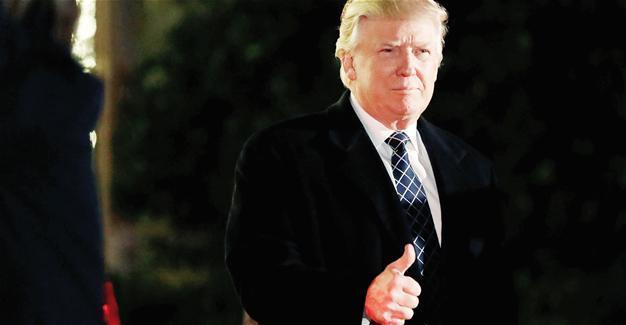Trump taunts China as he picks former rival Carson as housing secretary
WASHINGTON – Agence France-Presse

U.S. President-elect Donald Trump has fired off another Twitter broadside, attacking China over alleged currency manipulation and foreign policy, as he elects retired neurosurgeon Ben Carson, a presidential rival-turned-supporter, to serve as the head of the Department of Housing and Urban Development.
Meanwhile, Trump was expected to announce his pick for the vital role of secretary of state on Dec. 5.
America’s friends and foes alike are keenly awaiting Trump’s choice for the top diplomat role, hopeful that it will offer clues to the direction U.S. policy will take after he is sworn in on Jan. 20, 2017.
Based on Trump’s Twitter activity on Dec. 4, relations with America’s top trading partner may be headed for a downturn, with the businessman-turned-politician accusing Beijing of expansionism and of fiddling the exchange rate.
“Did China ask us if it was OK to devalue their currency [making it hard for our companies to compete], heavily tax our products going into their country [the U.S. doesn’t tax them] or to build a massive military complex in the middle of the South China Sea?” he demanded, adding: “I don’t think so!”
The taunt came two days after Trump provoked a rebuke from China by accepting a call from the president of Taiwan - the first such call in around four decades.
China regards self-ruling Taiwan as part of its own territory awaiting reunification, and any U.S. move implying support for independence is gravely offensive to Beijing.
Washington does not formally recognize Taipei, and officially cleaves to a “One China” policy that says Beijing is the legitimate government.
In practice, the island enjoys many of the trappings of a full diplomatic relationship with the U.S.
Trump’s incoming vice president, Mike Pence, played down the call’s significance, describing it as a courtesy, and said any new policy on China would be decided after his inauguration.
However, The Washington Post reported on Dec. 4 that the call had been in the works for weeks, intended to signal a major shift in U.S. policies toward Taiwan and China. The article cited people involved in planning the call.
Reaction from both the Chinese government and official media was unusually subdued after Trump’s tweets.
China had “no comment” on the tweets’ motivation, foreign ministry spokesman Lu Kang told reporters Dec. 5.
“We do not comment on his personality. We focus on his policies, especially his policies towards China,” he said, adding that economic relations between the countries had been “mutually beneficial.”
Meanwhile, Trump’s transition team said in a statement that “Dr. Carson is a distinguished national leader who overcame his troubled youth in the inner city of Detroit to become a renowned neurosurgeon who served as the director of pediatric neurosurgery at Johns Hopkins Hospital in Maryland.”
Carson, who like Trump has never held public office and has no government experience, recently said he was not interested in serving in Trump’s administration because he lacked experience in the federal government.
However, in accepting the appointment, Carson said, “I feel that I can make a significant contribution particularly by strengthening communities that are most in need.”
 U.S. President-elect Donald Trump has fired off another Twitter broadside, attacking China over alleged currency manipulation and foreign policy, as he elects retired neurosurgeon Ben Carson, a presidential rival-turned-supporter, to serve as the head of the Department of Housing and Urban Development.
U.S. President-elect Donald Trump has fired off another Twitter broadside, attacking China over alleged currency manipulation and foreign policy, as he elects retired neurosurgeon Ben Carson, a presidential rival-turned-supporter, to serve as the head of the Department of Housing and Urban Development.